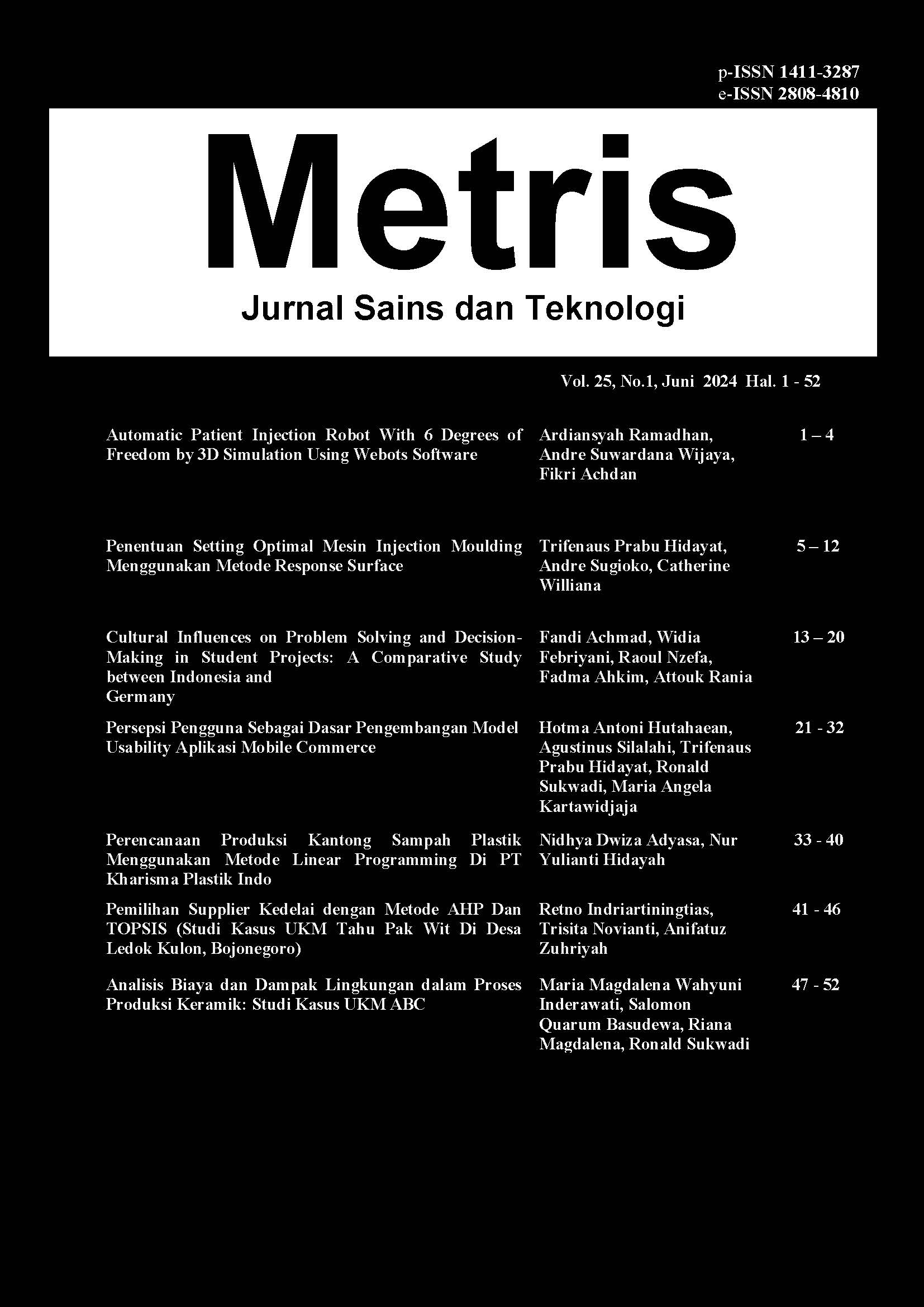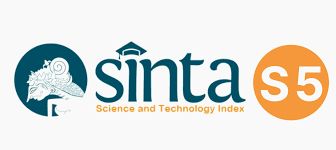Perancangan Sistem Erp Modul Point Of Sale Berbasis Odoo Pada Banyuwangi Festival Dengan Metode Rapid Application Development
DOI:
https://doi.org/10.25170/metris.v25i01.4651Keywords:
ERP, Odoo, Point of Sale, Banyuwangi Festival, UMKM, Disbudpar BanyuwangiAbstract
The sales report of SMEs at the Banyuwangi Festival is an indicator of the success of the festival. In the process of collecting the sales report, the Banyuwangi Tourism and Culture Office, as the current responsible party, still does it without an information system, making the management of the sales report of SMEs at the Banyuwangi Festival inefficient. Using the Rapid Application Diagram (RAD) method, the design of an ERP system in the form of a point of sale module based on the Odoo application at the Banyuwangi Tourism and Culture Office and the Banyuwangi Festival SMEs is carried out to obtain an efficient process of collecting the sales report of SMEs at the Banyuwangi Festival. The design using the RAD method is carried out to obtain results that are in line with user needs. The results of this research show that the designed ERP system can improve business process efficiency for institutions
and efficient sales management for SMEs. The impact of this research is expected to improve data management accuracy, increase collaboration, and optimize sales of Banyuwangi Festival SME products.
References
Abror, A., Patrisia, D., Trinanda, O., Omar, M. W., & Wardi, Y. (2021). Antecedents of word of mouth in Muslim-friendly tourism marketing: the role of religiosity. Journal of Islamic Marketing, 12(4), 882-899. DOI:https://doi.org/10.1108/JIMA-01-2020-0006
Abu-Shanab, E., Abu-Shehab, R., & Khairallah, M. (2015). Critical Success Factors for ERP Implementation: The Case of Jordan. Int. Arab. J. e Technol., 4(1), 1-7.
Achmad, F., Prambudia, Y., & Rumanti, A. A. (2023). Improving Tourism Industry Performance through Support System Facilities and Stakeholders: The Role of Environmental Dynamism. Sustainability, 15(5), 4103. DOI:https://doi.org/10.3390/su15054103
Achmad, F., Abdillah, I. T., & Amani, H. (2023). Decision-Making Process for Tourism Potential Segmentation. International Journal of Innovation in Enterprise System, 7(01), 19-30. DOI: https://doi.org/10.25124/ijies.v7i01.204
Achmad, F., Prambudia, Y., & Rumanti, A. A. (2023). Sustainable Tourism Industry Development: A Collaborative Model of Open Innovation, Stakeholders, and Support System Facilities. IEEE Access.
Achmad, F. (2023). Peran Inovasi dalam Meningkatkan Kinerja Industri Pariwisata Berkelanjutan di Indonesia. Jurnal
Multidisiplin West Science, 2(03): 150-157.DOI: https://doi.org/10.58812/jmws.v2i03.244
Ahmad, T., Iqbal, J., Ashraf, A., Truscan, D., & Porres, I. (2019). Model-based testing using UML activity diagrams: A systematic mapping study. Computer Science Review, 33, 98-112.
Damayanti, W., Jemakmun, & Suyanto. (2019). Rancang Bangun Aplikasi Point Of Sales Pada Apotek Kamila Berbasis Web.
Dennis, A., Wixom, H. B., & Tegarden, D. (2015). System Analysis & Design. http://store.visible.com/Wiley.aspx
Pradana, F. O., & Sutisna, E. (2022). Perancangan Sistem Informasi Penjualan pada One Mebel Menggunakan Metode Rapid Application Development (RAD) Berbasis Web. OKTAL: Jurnal Ilmu Komputer dan Sains, 1(10): 1638-1648.
Fatmasari, F., & Sauda, S. (2020). Pemodelan Unified Modeling Language Sistem Informasi Enterprise Resource Planning. Jurnal Media Informatika Budidarma, 4(2), 429-436. DOI: http://dx.doi.org/10.30865/mib.v4i2.2022
Fernandez, D., Zaino, Z., & Ahmad, H. (2018). An investigation of challenges in enterprise resource planning (ERP) implementation: The case of public sector in Malaysia. International Journal of Supply Chain Management, 7(3):113-117.
Ke. (2021). Adopsi Metode Rapid Application Development (RAD) Dalam Rancang Bangun Sistem Kalografi.
Kulkarni, R. N., & Srinivasa, C. K. (2019). Ameliorated methodology to represent UML use case diagram into table format. International Journal of Engineering and Advanced Technology, 9(1): 4099–4102. https://doi.org/10.35940/ijeat.A1329.109119
Li, R., Verhagen, W. J., & Curran, R. (2020). A systematic methodology for Prognostic and Health Management system architecture definition. Reliability Engineering & System Safety, 193, 106598.
Loka, I. D. C. L. (2017). Peran Dinas Kebudayaan Dan Pariwisata Banyuwangi Dalam Meningkatkan Jumlah Wisata
Mancanegara Dan Wisata Nusantara Di Kabupaten Banyuwangi.
Maulana, A. (2022). Peran Kementerian / Lembaga Negara untuk Meningkatkan Daya Saing Kepariwisataan Indonesia The Role of Ministries/State Institutions to Improve Indonesia’s Tourism Competitiveness. Badan Riset Dan Inovasi Nasional Jl. Gatot Subroto, 13(2), 2614–5863. https://doi.org/10.46807/aspirasi.v13i2.2916
Mulyono, E. S., Rahmadani, D. C., & Purbaya, M. E. (2021). Implementasi Sistem Enterprise Resource Planning Berbasis Odoo Modul Point of Sale pada Perusahaan PT. GF. Prosiding Sains Nasional dan Teknologi, 1(1).
Mutiara, V., & Sunarti, S. (2017). Peran Dinas Kebudayaan Dan Pariwisata Banyuwangi Pada Penyelenggaraan Festival Gandrung Sewu Sebagai Daya Tarik Wisata.
Permatasari, R. D., Ariyani, N. F., & Munif, A. (2019). Rancang Bangun API untuk Odoo ERP pada Modul CRM (Customer Relationship Management). http://ejurnal.its.ac.id/index.php/teknik/article/view/49403
Priyobodo, D. I., & Sulistiadi, W. (2022). Strategi Segmenting, Targeting, Positioning dan Bauran Pemasaran pada RS X dalam Mengembalikan Kepercayaan Pasien saat Pandemi Covid-19: Literature Review. Media Publikasi Promosi Kesehatan Indonesia (MPPKI), 5(4): 343-351. DOI: https://doi.org/10.56338/mppki.v5i4.2155
Sagala, D. M., Rahmadani, L., Rahmadani, Y., Wahyuningsih, E. S., Arifah, A., & Lawita, N. F. (2021). Penerapan Database pada Perusahaan (Studi Penerapan ERP pada PT. Sinar Sosro).
Sama, H., & Chandera, A. (2021, March). Perancangan Dan Pengembangan Online Shop Support System Berbasis Lean Canvas. In CoMBInES-Conference on Management, Business, Innovation, Education and Social Sciences,1(1) pp. 843-850.
Woyo, E. (2021). The sustainability of using domestic tourism as a post-COVID-19 recovery strategy in a distressed destination. In Information and Communication Technologies in Tourism 2021: Proceedings of the ENTER 2021 eTourism Conference, January 19–22, 2021 (pp. 476-489). Springer International Publishing.
Yudha, I. P. D. (2022). Pengembangan Sistem Pengelolaan Limbah Medis Berbasis OpenSource Erp Modul Pengelolaan Limbah Medis Padat Menggunakan Metode Quickstart.
Yuhdi, R., & Suranto, B. (2021). Penerapan Lean CanvasUntuk Pengembangan Startup Safir.
Yuniawati, P. S., & Widiasih, W. (2019). Usulan Strategi Mitigasi Risiko UMKM Handycraft di Sentra UKM Purabaya.
In Seminar Nasional Teknik Industri Universitas Gadjah Mada (pp. 1-5).
Zulkarnain, I., & Rumanti, A. A. (2023). Perancangan Sistem Customer Relation Management untuk Mengelola Business Partner Pada Banyuwangi Festival. Jurnal Metris, 24(02), 105-112.
Zulkarnain, I., & Perkasa, A. B. (2024). The Role of Stakeholders Analysis to Improving Supply Chain Sustainability Performance in the Tourism Industry. Jurnal Multidisiplin West Science, 3(05): 547-555












